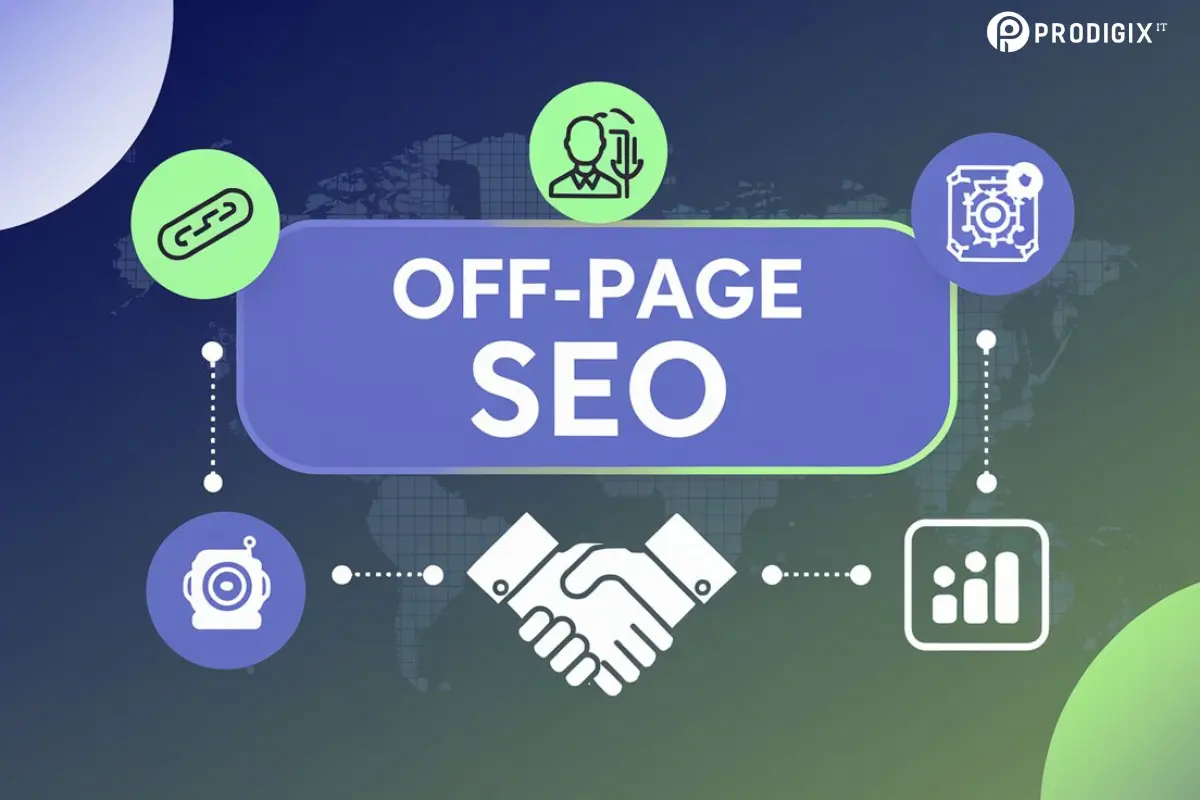
In the ever-evolving digital marketing landscape, off-page SEO holds significant importance. But what is off-page SEO in digital marketing? In simple terms, off-page SEO refers to all the actions taken outside your website to improve its ranking on search engine results pages (SERPs).
These activities, such as backlink building, social media marketing, and influencer outreach, help enhance your site’s authority, trustworthiness, and overall visibility.
This blog will explore off-page SEO, why it matters in digital marketing, and how leveraging off-page strategies can help boost your online presence and search engine rankings.
Off-page SEO is critical to your website’s success because search engines look at what others say about your site. While on-page SEO tells search engines what your site is about, off-page SEO shows them how much others trust it.
Here’s why off-page SEO matters:
Many quality backlinks (links from other sites to yours) make search engines trust your content. The more trustworthy links you have, the higher your domain authority (a measure of your website’s trust) will be. This leads to better rankings in search engines.
Backlinks are a major part of off-page SEO. When high-authority websites link to your site, Google sees this as a sign that your content is valuable. This will improve your rankings.
The higher you rank on search engines, the more people will see your site. This means more visitors without having to pay for ads. Off-page SEO techniques, like link building and social media sharing, help bring in more organic (free) traffic.
As your site ranks higher, more people will recognize and trust your brand. Off-page SEO methods like working with influencers or engaging on social media build your reputation and make you more memorable.
Off-page SEO gives you the chance to connect with others. You can build relationships by guest blogging, reaching out to influencers, or joining online communities. This often leads to more backlinks and mentions of your brand.
Off-page SEO works by increasing the number of positive signals from outside sources that point to your website. These signals can include backlinks, social media mentions, and even reviews. The more trustworthy these signals are, the better your site will perform in search engines.
Here’s how it works in detail:
Knowing the difference between on-page and off-page SEO is important to understanding off-page SEO. Both are needed for a good SEO strategy, but they have different jobs.
On-page SEO is everything you do on your own website to make it better for search engines. This includes:
The goal is to make your website easier for search engines to understand and rank.
On the other hand, off-page SEO focuses on how different websites and platforms see your site. It’s about building your site’s authority and trust through backlinks, social media, guest posts, and brand mentions.
While you don’t control these directly, you can influence them by building relationships and engaging with others.
Here are some effective off-page SEO strategies to help improve your website’s authority and rankings:
Backlink building: One of the most important off-page SEO strategies is gaining high-quality backlinks from trusted websites. Aim for links from reliable sources like industry blogs or news sites.
Guest blogging: Writing posts for other websites helps build backlinks and gets your name out there. Make sure your content is helpful and fits the site’s audience.
Social Media Marketing: Sharing your content on social media helps spread the word. More visibility can lead to more traffic and backlinks.
Influencer outreach: Partnering with influencers can boost your content and brand. They can review or share your website, helping drive traffic and authority.
Forum Participation: Participate in online discussions on sites like Reddit or industry forums. Add value to the conversation and link back to your site when relevant.
Blog Commenting: Leaving helpful comments on industry blogs can help you connect with other bloggers and bring visitors to your site. Just make sure your comments add to the discussion.
Directory submissions: Submit your website to relevant online directories, especially those in your niche or local area. Avoid low-quality or spammy directories.
Broken links building: Find broken links on trusted websites and suggest your content as a replacement. This helps both you and the website owner.
Brand mentions: Look for unlinked mentions of your brand and ask the website to add a link to your site.
Press Releases and Media Coverage: Getting media attention for your business or industry news can lead to valuable backlinks. Write strong press releases and share them with the right publications.
Off-page SEO includes all the efforts made outside of your website to improve its ranking. It focuses on building backlinks, increasing brand visibility, and improving your online reputation.
Some examples include link building, guest blogging, social media marketing, influencer outreach, and directory submissions.
Backlinks act as "votes of confidence" from other websites. When trusted sites link to yours, it signals to search engines that your content is valuable, helping improve your ranking.
Off-page SEO is a long-term process. It may take several months to see significant results. Factors like the quality of your backlinks and the competitiveness of your industry will impact how quickly you see improvements.
Understanding what is off-page SEO in digital marketing is essential for building a well-rounded SEO strategy. Off-page SEO goes beyond optimizing your website’s internal elements and focuses on external factors like backlinks, social media signals, brand mentions, and online reputation. These elements are critical in determining how search engines perceive your website’s authority, relevance, and trustworthiness.
Effective off-page SEO techniques, such as link building, influencer outreach, guest blogging, and social media marketing, can significantly enhance your website’s visibility and rankings in search engine results.
Combining both on-page and off-page SEO ensures that your site is optimized for search engines and recognized by users and other websites as a credible and valuable resource.

support@prodigixit.com
nice post